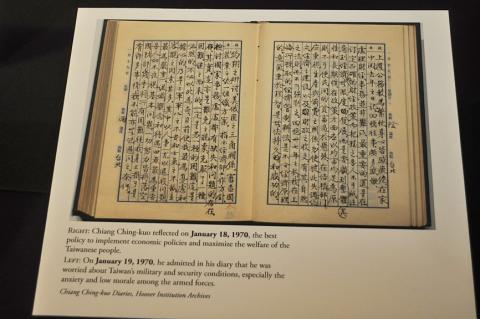Stanford University’s Hoover Institution on Tuesday gave a preview into the personal diaries of former president Chiang Ching-kuo (蔣經國), which are to be open to public viewing starting in February.
The diaries show Chiang focused on Taiwan’s political and economic development in the late 1960s and early 1970s, in sharp contrast to his father, Chiang Kai-shek (蔣介石), said Lin Hsiao-ting (林孝庭), curator of East Asia collections at Hoover Institution Library and Archives.
Based on the elder Chiang’s diaries, “his heart was always with mainland China, and he was mostly interested in retaking the mainland,” Lin said.

Photo: CNA
The Chiang Ching-kuo diaries cover May 1937 to December 1979, and offer insight into his life from the time he returned to China from Soviet Russia and his move to Taiwan.
The diaries of the year 1948 were lost, while the entries from 1937 to 1940, and from 1945 to 1949 are transcripts, and the rest are handwritten originals, Lin said.
Chiang Ching-kuo, who served as president from 1978 until his death in 1988, stopped keeping a diary in 1979 for reasons that are not known, Lin said, adding that it might be due to health problems, because he underwent prostate surgery that year.
During the preview, the institution showed a selection of the copied and original Chiang Ching-kuo diaries, focusing mostly on his participation in major decisionmaking processes in Taiwan after 1949.
Among the most notable entries was his reaction after he was told in the early hours of Dec. 16, 1978, by then-US ambassador Leonard Unger that Washington was severing ties with Taipei.
It was a hard blow for Chiang Ching-kuo, who wrote: “[I am] in agony. While shouldering heavy responsibilities, [I] should handle it rationally and calm people down first.”
He also wrote that he thought Taiwan’s “strength” and “morality and sense of justice” would serve as the core of the nation’s diplomacy thereafter.
According to entries written on Jan. 18, 1970, he said the best policy for Taiwan was developing the economy, and he wanted to work for the well-being of the people.
The diaries are to be available for public viewing in their entirety at the Hoover Archives’ Reading Room, which is to open in February. They will also complement the collection of diaries from 1915 to 1972 left by his father, who led China from 1928 to 1949 and then ruled Taiwan after the Chinese Nationalist Party (KMT) lost the Chinese Civil War to the communists in 1949 until his death in 1975.
The elder Chiang’s diaries were made public by the institution in 2006 and have since been the most requested collection in the institution’s possession.
The institution has held the diaries of the Chiangs since 2005, when Chiang Ching-kuo’s daughter-in-law Chiang Fang Chih-yi (蔣方智怡) signed a 50-year agreement for the documents to be curated by the institution.
Legal disputes over ownership of the diaries have been ongoing since, but all parties involved last summer agreed to make them public to facilitate research.

‘DENIAL DEFENSE’: The US would increase its military presence with uncrewed ships, and submarines, while boosting defense in the Indo-Pacific, a Pete Hegseth memo said The US is reorienting its military strategy to focus primarily on deterring a potential Chinese invasion of Taiwan, a memo signed by US Secretary of Defense Pete Hegseth showed. The memo also called on Taiwan to increase its defense spending. The document, known as the “Interim National Defense Strategic Guidance,” was distributed this month and detailed the national defense plans of US President Donald Trump’s administration, an article in the Washington Post said on Saturday. It outlines how the US can prepare for a potential war with China and defend itself from threats in the “near abroad,” including Greenland and the Panama

A magnitude 4.9 earthquake struck off Tainan at 11:47am today, the Central Weather Administration (CWA) said. The hypocenter was 32.3km northeast of Tainan City Hall at a depth of 7.3km, CWA data showed. The intensity of the quake, which gauges the actual effect of a seismic event, measured 4 in Tainan and Chiayi County on Taiwan's seven-tier intensity scale, the data showed. The quake had an intensity of 3 in Chiayi City and County, and Yunlin County, while it was measured as 2 in Kaohsiung, Nantou County, Changhua County, Taitung County and offshore Penghu County, the data showed. There were no immediate reports of

The Chinese Nationalist Party (KMT) is maintaining close ties with Beijing, the Democratic Progressive Party (DPP) said yesterday, hours after a new round of Chinese military drills in the Taiwan Strait began. Political parties in a democracy have a responsibility to be loyal to the nation and defend its sovereignty, DPP spokesman Justin Wu (吳崢) told a news conference in Taipei. His comments came hours after Beijing announced via Chinese state media that the Chinese People’s Liberation Army’s Eastern Theater Command was holding large-scale drills simulating a multi-pronged attack on Taiwan. Contrary to the KMT’s claims that it is staunchly anti-communist, KMT Deputy

RESPONSE: The government would investigate incidents of Taiwanese entertainers in China promoting CCP propaganda online in contravention of the law, the source said Taiwanese entertainers living in China who are found to have contravened cross-strait regulations or collaborated with the Chinese Communist Party (CCP) could be subject to fines, a source said on Sunday. Several Taiwanese entertainers have posted on the social media platform Sina Weibo saying that Taiwan “must be returned” to China, and sharing news articles from Chinese state media. In response, the Mainland Affairs Council (MAC) has asked the Ministry of Culture to investigate whether the entertainers had contravened any laws, and asked for them to be questioned upon their return to Taiwan, an official familiar with the matter said. To curb repeated